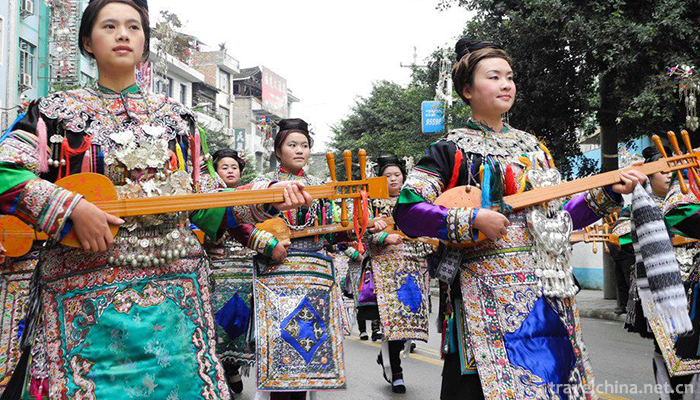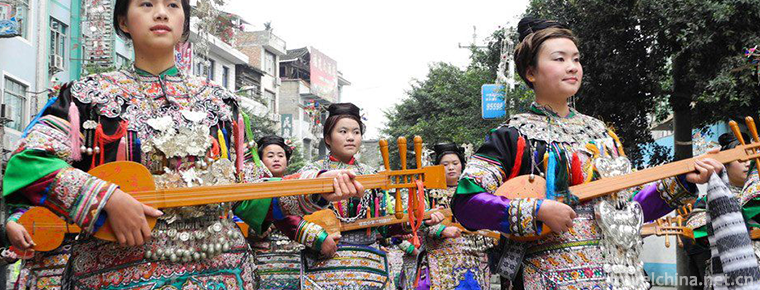Sama Festival of Dong Nationality
Sama Festival of Dong Nationality
Sama Festival of Dong Nationality is spread in Rongjiang County, Liping County, Congjiang County and the surrounding areas of Dong Nationality in Guizhou Province. It is mainly represented by the Sama Festival of Chejiang Dong Nationality in Rongjiang County. Sama Festival is the oldest and grandest traditional festival in the Dong Nationality area of southern Guizhou Province, which is inherited from the customs of the Maternal Clan of Dong Nationality in the social period. Sanbao Dong Village of Chejiang Dam in Rongjiang County is the largest festival.
The State attaches great importance to the protection of intangible cultural heritage. On May 20, 2006, the Sama Festival folklore of the Dong Nationality was approved by the State Council to be included in the first batch of national intangible cultural heritage lists. (Category: Folklore).
Historical origin
Sama Festival is the oldest traditional festival of the Dong people in the south, and it is a legacy of the customs of the matriarchal clan society of the Dong people.
"Sama" is a transliteration of the Dong language. Sama means grandmother. Samarco translates it into Chinese as "grandmother" (also known as Sa-year-old). She is the embodiment of the common ancestor gods of the whole Dong nationality (especially in the southern dialect area). The Dong people believe that the ancestor gods are powerful and supreme, which can give people the strength to defeat the enemy, nature, disaster and win the village Anle, Wugu Fengdeng and Ren. Animals flourished, so they worshipped them piously and were regarded as the Social God of the Dong nationality.
At the same time, Sama is the legendary ancient heroine, occupying an important position in the political, military and cultural aspects of the ancient society of the Dong Nationality. It is said that as early as in the matriarchal clan society, there was a brave and warlike female leader of the Dong Nationality who made great achievements in the battle against the invasion of the enemy. Unfortunately, in one battle, she was surrounded by dozens of enemy soldiers and sacrificed at last. She is regarded as a God who can bring peace and auspiciousness. She is honored as "Sama". There is a saying in Dong Township: Sada of Dong and Temple of Hakka (Han Nationality). In the hearts of Dong people, Sama is their greatest god.
In order to offer sacrifices to Sama, people built mounds of earth on the turf in the middle of the stockade as altars and places for offering sacrifices to Sa - "Ran Sa" (Dong language, "Ran" is a house, translated into Chinese as "Grandmother's house", also known as Sama Temple and Notre Dame Temple). In some Dong stockades, Sama Temple was built. During the Guangxu period of the Qing Dynasty, the open-air altars in the villages of Sanbao were successively built as "Ran Sama House", which is quite meaningful. There are no gods, only the throne. There is a big black umbrella half open on the throne and a pile of stones under the umbrella. That is the symbol of Sa. It symbolizes the happiness, health and unity of the Dong people under the protection of Sama Ying Ling.
Every year in the first month and February of the lunar calendar, a grand ceremony will be held in "Ranza". The scene is huge and spectacular. It has been handed down from generation to generation, forming today's "Sama Festival".
Main activities
Sama Festival is usually held in the first and second months of the lunar calendar, but sometimes it is held in other months according to production, life or other major activities. The scale of the sacrifice is usually sacrificed by villages (Tuanzhai). Some also invite joint sacrifices by neighboring villages, villages or neighboring areas. The scenes are spectacular. The villages of Sanbao Dong Township in the Rongjiang River are mainly married women (and a few men who are respected also participate). Therefore, the activities of sacrificing Buddha in Sanbao Dong Township in the Rongjiang River have a long tradition of matriarchal clan society.
Sama Festival is usually held in spring and autumn. It retains a strong matriarchal clan social legacy. The altar is generally managed by a respectable old woman in the village, while the ceremony of sacrificing the Sama is usually attended only by middle-aged and elderly women and elderly men. When sacrificing the Sama, first the Guan Sa people cook tea, offer tea to Sa, and then the hostesses of each household dress in full dress are lined up. The team went to the sacrifice. Each of them took a sip of grandmother's tea, plucked a small evergreen branch into their hair bun, followed the old woman with a half-open umbrella around the village, and finally came to a specific venue to sing and dance with Sa in a solemn and warm atmosphere. The Dong people prayed for the village to be safe and prosperous and everyone to be happy and auspicious. On Sama Festival, most Dong men were willing to do so. The local people say that Sama Day is also the Women's Day of the Dong Nationality.
The size of the sacrificial sacrifice is very large and magnificent. All the women dress up. When sacrificing the sacrificial sacrifice, the Guansha people first cook tea and offer tea to Sa Jingxiang. Then the ladies dressed in costumes line up to offer sacrifices. Each of them drinks a mouthful of grandmother's tea, picks a small evergreen branch and inserts it in the hair bun. They take the village as a unit and walk along the field, the ancient road by the river to Gulou Square, and the main village of Sanbao is in the main village. At Zhaikou, there are Lalu liquor on the roadside, while some of the Samar team in the Hakka village pretend to be "beggars" wearing straw clothes without clothes and trousers in ancient times. When they come to Zhaikou, beggars beg for liquor and their hosts toast each other with songs, the ancient customs reappear, which is impressive and very strong and unforgettable all their lives.
Inheritance value
Sama Festival has a profound influence on the ideology of the Dong people. The virtues of "the best" of the ancestors play a decisive role in the prosperity of the Dong people. Therefore, respecting the elderly has become a fine tradition handed down from generation to generation by the Dong people. Sama is the God of protection, unity and entertainment of the Dong people. Sama culture has a long history and rich connotation, and has much to do with the social life of the Dong people. The profound influence of this aspect.


-
2.Beijing Olympic Park
Beijing Olympic Park Located in Chaoyang District of Beijing, Beijing Olympic Park is located at the north end of the central axis of Beijing
Time 2018-11-24 -
3.Genghis khan mausoleum tourist area
Genghis khan mausoleum tourist area, also known as Chengling Tourist Area, commonly known as the Eastern Union Scenic Area (not Genghis Khanling)
Time 2018-12-01 -
4.Kongtong Mountain Scenic Spot
Kongtongshan Scenic Area is located 12 kilometers west of Pingliang City, Gansu Province. It overlooks Xi'an in the east, Lanzhou in the west, Baoji in the South and Yinchuan in the north
Time 2018-12-12 -
5.Qilian Mountain National Nature Reserve
Gansu Qilian Mountain National Nature Reserve is located at the northern foot of Qilian Mountain in the intersection zone of Qinghai-Tibet, Mongolia
Time 2019-02-07 -
6.Xianghu Lake
Xianghu Lake is known as the "sister lake" of the West Lake for its beautiful scenery. It is a lake located in Xiaoshan District, Hangzhou City, Zhejiang Province, China. Xianghu Lake is als
Time 2019-02-25 -
7.han opera
Guangdong Hanju Opera, formerly known as "Ran Tan", "Waijiang Opera" and "Xingmei Hanju Opera", is one of the Hakka Opera genres in Guangdong Province
Time 2019-05-01 -
8.Nu Dabian Dance
"Dabian Dance" is one of the representative dances of the Nu nationality, which is spread in the Nujiang Lisu Autonomous Prefecture Fugong County Nu villages. Dabian dance is characterized b
Time 2019-06-08 -
9.Uygur Dastan
Uygur Dastan is a kind of Uygur singing and playing music. It is a kind of long narrative poem with rap and singing. It is a long poem with complete stories and characters. It is a folk art form with
Time 2019-06-26 -
10.Mounting and repairing techniques
The mounting and repairing technique of ancient Chinese characters and paintings is a kind of traditional Chinese handicraft. It is used for restoration and restoration of ancient calligraphy and pain
Time 2019-08-10 -
11.Chengdu Yongling Museum
The Royal Museum of Wang Jian, located at No.10 Yongling Road, Jinniu District, Chengdu, covers a total area of 54000 square meters, and is composed of three parts: cultural relics protection area, comprehensive museum and garden protection area.
Time 2020-10-18 -
12.Taoping Qiang Village
Taoping Qiang village is located in Taoping Township, beside Zagunao River in Lixian County. Qiang village is 40 km away from Lixian City, 16 km from Wenchuan city and 139 km from Chengdu. It is a national key cultural relics protection unit and an important scenic spot in Jiuhuang line tourism circle.
Time 2020-11-07